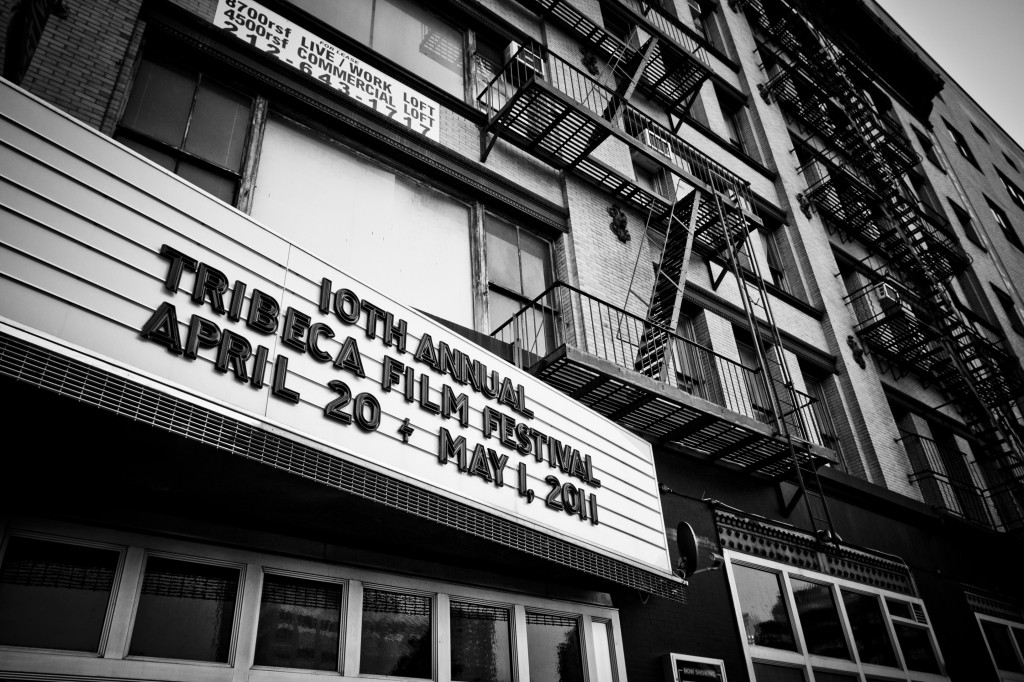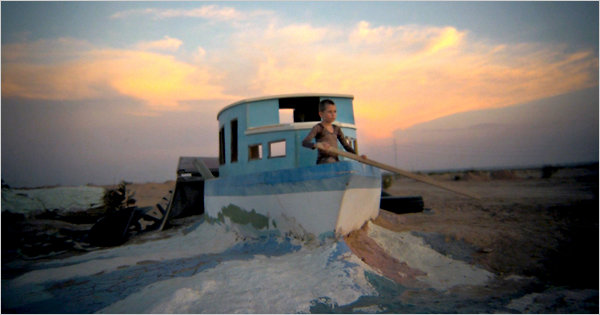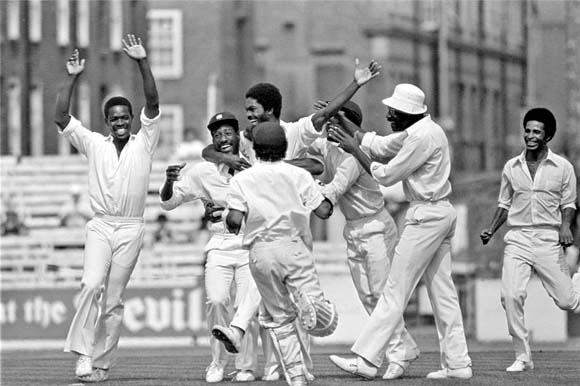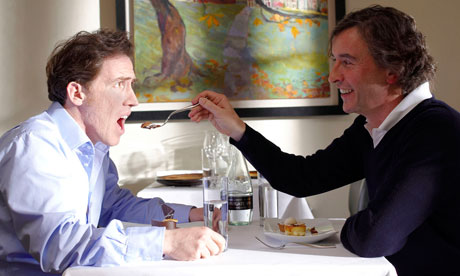Sun 1 May 2011
Tribeca Film Festival 2011
Posted by Ethan under Film Festivals
Comments Off on Tribeca Film Festival 2011
The 10th Annual Tribeca Film Festival screened its last set of films today. Here are quick reviews of some of the films I had the chance to see during the festival’s week-and-a-half long run.
Beats, Rhymes & Life: The Travels of A Tribe Called Quest
Directed by Michael Rapaport
***
I can’t claim to have been a big fan of A Tribe Called Quest back when the seminal rap group dropped their first album in 1990. Back then my 12-year-old self primarily listened to his Paul Simon audiocassettes, occasionally taking the time out to give The Simpsons Sing the Blues a spin. But I was vaguely aware of Tribe and liked the few songs of theirs that I heard. Still, because I didn’t follow them closely, I didn’t learn until long after the fact that they went through an acrimonious break-up in the late ‘90s. Beats, Rhymes & Life, the directorial debut of actor Michael Rapaport, covers the group’s history against the backdrop of their trouble-ridden reunion tour in 2008. Granted full access to all four members of the group, including frontman Q-Tip and his friend/rival Phife Dawg, Rapaport gets them to open up about their various highs and lows and also captures some surprisingly candid behind-the-scenes moments. As a piece of filmmaking though, the documentary is somewhat rough around the edges; Rapaport occasionally loses track of the group’s chronology and he leaves a few potentially interesting lines of questioning unexplored. Still, full credit to the director for pulling off a rock doc that’s meatier than your average “Behind the Music” episode.
Beyond the Black Rainbow
Directed by Panos Cosmatos
***1/2
A sure-fire midnight movie in the making, Beyond the Black Rainbow is a stylish synthesis of vintage science-fiction films from the ‘70s and early ‘80s, movies with titles like Zardoz, Silent Running and Logan’s Run. Despite its bizarre trappings, the film’s story is actually quite straightforward: born and raised in a secret laboratory, a teenage girl uses her unique psychic powers to mount an escape from her captor, a scientist that bears a surely intentional resemblance to Michael York. But plot decidedly takes a backseat to mood here, as director Panos Cosmatos (who I interviewed earlier in the week) creates a dreamlike atmosphere through unconventional pacing, strange imagery and cinematography and shot composition that renders familiar environments entirely alien. Like the best cult headtrips, Beyond the Black Rainbow is occasionally frustrating, but always fascinating.
Bombay Beach
Directed by Alma Har’el
***
Back in the swinging ‘60s, Bombay Beach was one of several up-and-coming towns located around California’s Salton Sea, a place where happy families could live in modest, but comfortable middle-class surroundings. Flash forward four decades later and the entire area has largely gone to seed, dotted with crowded houses in desperate need of repair and trailer parks populated by drug addicts and people with no other place to go. Israeli director Alma Har’el took her camera to present-day Bombay Beach and followed a handful of the town’s residents, including a high-school football player with dreams of turning pro, an elderly man with health problems (he suffers a stroke during the course of filming) and the youngest son of lower-income family who has been diagnosed as bipolar. The resulting film is more of an impressionistic take on life in this town than a straightforward documentary portrait, with Har’el incorporating several flights of fancy into the film, including an odd dance number between the football star and his girlfriend and a final sequence that sends the young boy riding through the dusty streets on a fire engine. Though these added flourishes don’t always work, the setting and these individuals do capture the viewer’s imagination. We hope for some of them to find a way out of Bombay Beach, even though it’s not clear that they will.
Catching Hell
Directed by Alex Gibney
***1/2
Back when ESPN first announced the line-up of documentaries in their ambitious 30 for 30 series, one of the film’s I was most looking forward to was Alex Gibney’s look back at the infamous Steve Bartman incident that defined the 2003 National League playoff series between the Chicago Cubs and the Florida Marlins. For those of you with short memories, Bartman was a die-hard Cubs fan who may have cost his beloved team a shot at the World Series by reaching for a foul ball that otherwise may have been caught by right fielder Moises Alou. That play didn’t specifically decide the game, but it did appear to spook the curse-ridden team enough that they immediately gave up 8 runs to their opponents, forcing another game that they also lost. Despite the fact that the Cubs themselves were responsible for the loss rather than the poor guy sitting in the stands, Bartman became Public Enemy #1 in the Windy City and briefly had to go into hiding to avoid the media not to mention irate fans. To this day, he refuses to discuss the incident, even with a pedigreed filmmaker like Gibney. As it turns out, Bartman’s absence from the documentary feels appropriate—after all, the movie is less about him than it is about the public’s reaction to him. In true journalistic fashion, Gibney reconstructs the events of that fateful night in minute detail, showing exactly how the mood of the stadium turned from euphoric to murderous in the span of a single half-inning. This section is reason enough to see Catching Hell, but the movie also effectively incorporates the tale of another scapegoat, Bill Buckner, the Boston Red Sox player that famously let a crucial ball slip through his glove at the 1986 World Series. Unlike Bartman, Buckner did agree to be interviewed on camera and he has some interesting things to say about his time as the most hated man in Beantown. Catching Hell does falter somewhat in the homestretch as Gibney strains to push these twin narratives to an unnecessarily redemptive conclusion. But hopefully its compelling presentation of the ugly side of fan loyalty will inspire more people to abide by that age-old mantra—“It’s only a game.â€
Fire in Babylon
Directed by Stevan Riley
**1/2
Soccer (or, if you insist, football) is generally regarded as this country’s most significant sports-related blind spot, but the game of cricket enjoys an even lower profile on these shores. So it’s up to British documentary filmmaker Stevan Riley to fill us in on a significant chapter in the sport’s long history, namely the nearly two-decade dominance of the West Indies cricket team, which led the world in wins from roughly the late ‘70s to the mid-‘90s. They key to the squad’s success was their skill at “fast bowling†a style of play where the cricket ball is pitched at speeds that effectively turn it into a kind of weapon. The West Indies squad didn’t invent fast bowling, but they employed it better than just about anyone else, which made them a source of pride back at home and a pack of troublemakers everywhere else. Fire in Babylon attempts to function as both a sports documentary and a social history, connecting the rise of West Indies cricket to the improving fortunes of the former colonies in the wake of their newly won independence from the British. Riley’s attempts to link these two narratives sometimes fall short though and he rushes through events—like the decision of some West Indian players to accept an invitation from the South African government to play a test match on their soil, a move some saw as an endorsement of apartheid—that cry out for more context. If nothing else though, non-cricket fans will at least come away from Fire in Babylon knowing the difference between a bowler and a batsman.
Like Water
Directed by Pablo Croce
***
In the run-up to the 2010 title bout between mixed-martial arts champion Anderson Silva and his latest challenger Chael Sonnen, Pablo Croce spent several months embedded in Silva’s camp to observe what made this fighter tick. Despite his best efforts, the director never really gets to the heart of that question largely because Silva—a man of few words, but lots of rambunctious energy—is the kind of person that seems to avoid self-reflection, at least when the camera is turned on. Having invited the film crew into his circle, he keeps them decidedly at arm’s length. If the movie doesn’t exactly work as a probing psychological profile, it does make for an entertaining real-life Rocky story complete with training montages and a tense climactic fight that even had this MMA neophyte caught up in the action.
Magic Valley
Directed by Jaffe Zinn
**1/2
The shadow of Gus Van Sant looms large over this slice-of-life small-town drama, which employs a number of that director’s familiar formal touches (including Paranoid Park’s impressionistic narrative and those famous Steadicam shots from Elephant where the camera is perched directly behind a character’s head) as it unspools its four interconnected story threads set over the course of a seemingly ordinary day. In one, a teenage boy wanders around in a daze, clearly haunted by some recent event. In another, the town sheriff goes for a ride-along with a fresh-faced rookie officer that doesn’t particularly seem pleased to have him riding shotgun. Elsewhere, a fish farmer makes an unwelcome discovery about his harvest while his wife goes through her mundane routine—taking the dog to the vet, buying groceries—until she realizes that her daughter is missing. Finally, two young brothers find a dead body in a field by their house and decide to give it a proper burial. First-time writer/director Jaffe Zinn demonstrates a strong eye for the Midwestern landscape and allows the proceedings to unfold at an unhurried, but never slack, pace. Still, it’s hard to escape the feeling that Van Sant would have dug a little deeper into this intriguing, but thin scenario, posing more intriguing and potentially profound questions than “What happened?†and “Who dunnit?â€
The Trip
Directed by Michael Winterbottom
***
The third collaboration between director Michael Winterbottom and British comics Steve Coogan and Rob Brydon was originally filmed as a six-episode series for British television, but is being released stateside in a shorter theatrical cut. To be honest, it’s hard to imagine that much was lost on the cutting room floor. That’s not to imply that The Trip isn’t enjoyable—Coogan and Brydon are too skilled a comic team to let five minutes pass without at least one solid laugh—but it is the slightest of their efforts with Winterbottom, lacking the zip and energy of 24 Hour Party People and the high-wire meta brilliance of Tristram Shandy, one of the best comedies of the past decade. The premise is simple: having been assigned to tour some of northern England’s finest restaurants for a London paper, Steve Coogan (played by, of course, Coogan) reluctantly brings along his colleague and competitor Rob Brydon (Brydon) as his traveling companion. As the duo eats their way across the British countryside, they wrestle with various problems (including Coogan’s frustration with his stalled career, not to mention his envy of Brydon’s success) and bicker over such minutia as which of them does the best Michael Caine impression. (For the record, I’d have to hand the title to Coogan.) It’s a pleasure to listen to these two pros riff off each other over plates of delectable-looking food and there’s something compelling about Coogan’s achingly self-aware portrayal of an actor haunted by professional and personal failures. But the movie’s meandering nature eventually grows somewhat tiresome and the end of the journey lacks any real comic or emotional heft. All in all, it’s a pleasant trip to a disappointing destination.  Â





No Responses to “ Tribeca Film Festival 2011 ”
Sorry, comments for this entry are closed at this time.